Brian Boru Review
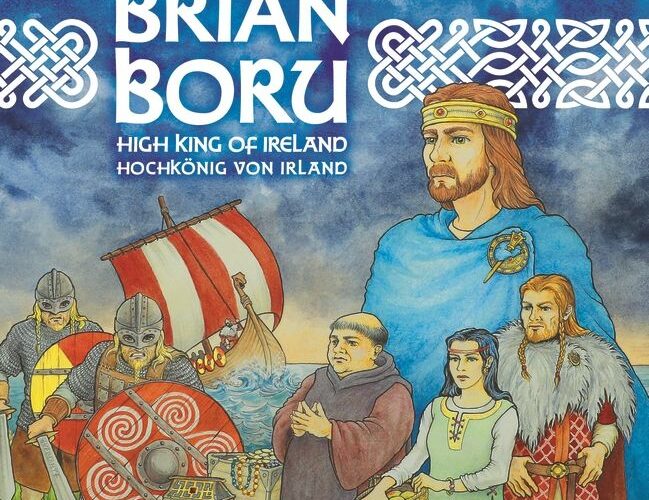
Peer Sylvester is the designer behind one of my favourite games ever: The King Is Dead. Given that game, and others like Wir sind das Volk!, and König von Siam, he has excellent pedigree for area control and card-driven action games. When Brian Boru: High King of Ireland was announced, I got excited.
Like, really excited.
Without delving too deeply into the historical roots, Brian Boru was the ruler of Ireland at around 1000AD. The game loosely follows the situation in Ireland at the time, with different clans vying for power, and those-who-would-be-rulers trying to unite the nation, fend off the Viking invasions, rebuild the religious buildings, and use arranged marriages to strengthen foreign bonds. How this happens in the game is with a mixture of trick-taking and area control, and it’s a blast.
Hello tarot
The first thing that struck me when I opened the box, was the tarot-size cards used in the game. Cards are so often a means to an end in games, but the added size – while being an impediment to small-handed shufflers – adds appropriate significance to their importance in the game. You see, every turn in the game is based around selecting a card in your hand (which you drafted during the drafting phase), and playing it in the current trick.
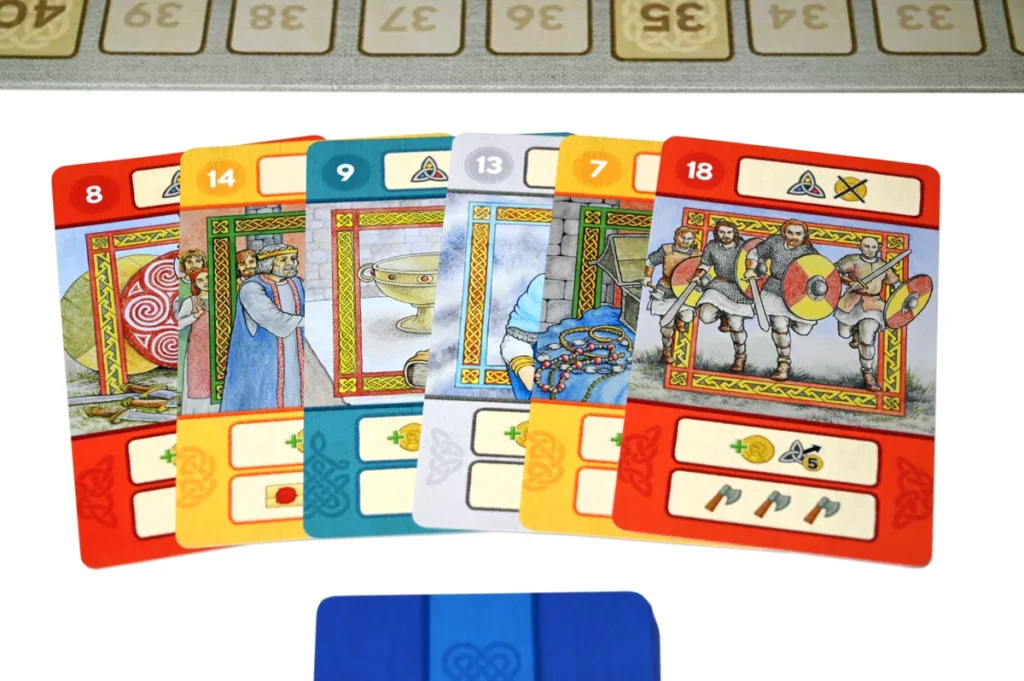
I’ve played plenty of trick-taking games in the past, and the concept is now mainstream thanks to games like The Crew, but the concept of combining it with area control is a new one to me. In a nutshell, the active player chooses a town on the map, and starts a trick in that town’s colour. The winner of the trick takes the action on the top of their played card, which is usually at least placing a marker of their colour on that town. The really interesting stuff happens in the cracks in-between, with the players who lost the trick.
Every card has two optional actions on the bottom, and players who lose the trick choose one to activate, in ascending numerical order. The order the actions are taken is really important, as some of the ways to score in the game are order-critical. Take the marriage track for example. You can move your token up the track, hoping to be the highest on it when the round ends, taking the hand of the bride-to-be. In contrast to a lot of games, places on the track cannot be shared. If you’re going to advance, you need enough steps to jump clear over the other would-be suitors. Playing earlier in turn order means it more difficult for those playing higher-ranked cards.
Trick or treat
Turn order often has a level of significance in a game, but I love just how important it is in Brian Boru. I also love the fact that the low-ranking cards in your hand don’t feel useless. Tricks feel a little different than in many games, as there’s no obligation to follow suit, or beat rank. Winning a trick is important, as it lets you claim the contested town, increasing your clan’s influence in that region, but losing a trick can be just as important. It’s a brilliant dichotomy which makes every turn feel significant.
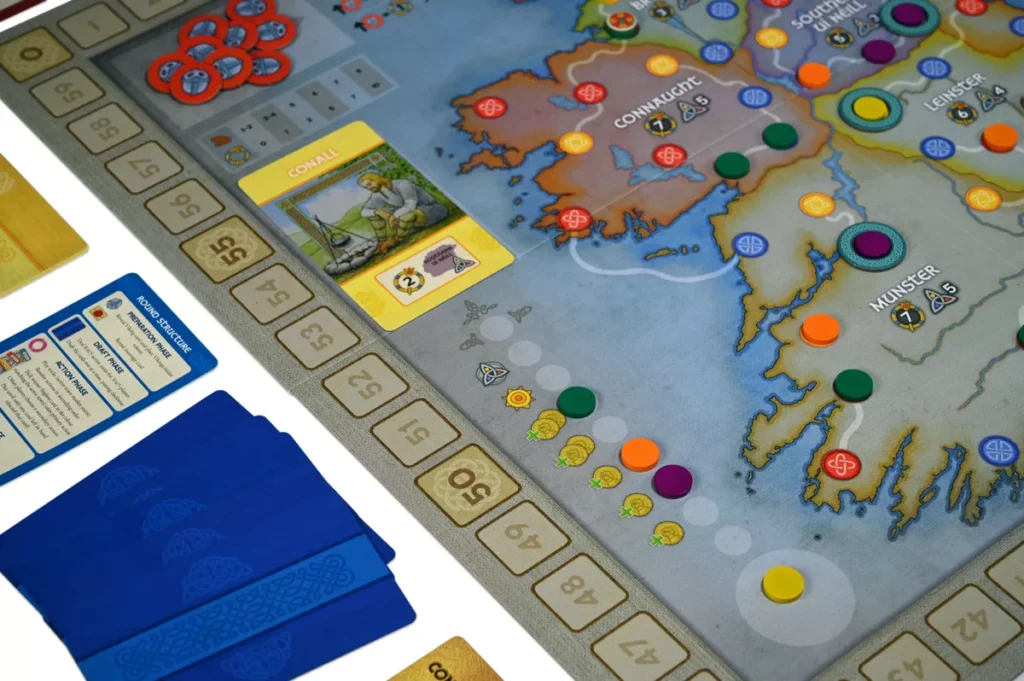
It’s so rare that a game manages to keep every player rapt through every turn, but Brian Boru does just that. Nothing feels insignificant, and every other player’s turn is something you have to pay attention to, if you want to win. Winning a trick feels double-edged, like you’re missing out on something else, and the three areas you can influence are similar in this. If you’re the best at repelling Vikings, donating to the churches, or… getting married… you get big rewards at the end of the round, but your influence in each area gets reset, while everyone else keeps some.
Ultimately, it’s an area control game. The connections between towns on the map give you plenty to think about, because a common action is to spend five coins to expand into, and take control of, a connected town. Some of these connections cross region boundaries, some even traverse the sea, so careful placement of your discs is vital. It’s something that doesn’t really show its significance until the end of your first game, but you’ll get it soon enough.
Bumps in the road
It would be negligent of me to not talk about my biggest issue with the game, and that’s the rulebook. For the most part, the rulebook is fine. Turns are simple enough, the game’s concepts and mechanisms are easy to understand. The problems lie with the ambiguity in places, the things that aren’t fully explained. They don’t render the game bad, not by any means, but it can leave a slightly sour taste in the mouth for that first learning game.
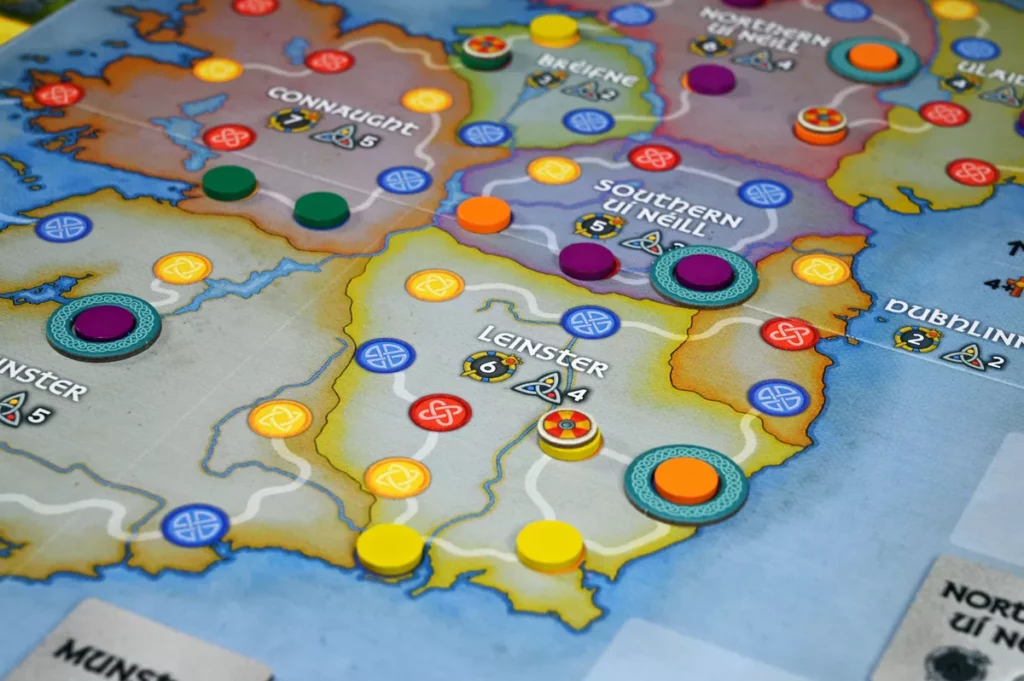
My first game of Brian Boru was at AireCon, and we played a five-player game. At least three of us were very experienced gamers, and we couldn’t even start our first round, because the rules tell you to ‘play a card from your hand’ but don’t tell you whether that’s face-up or -down. In most games you’d assume face-up, but in a game where you don’t have to follow suit or rank, we couldn’t be sure. That’s just one example, but there were plenty of times we stopped to check the book, or the game’s BGG forums, for clarification. To save you the same hunting, there’s a great thread with collected corrections and clarifications here.
The biggest problem is for German players. In the intended game – the game in the English rulebook – each round consists of playing four of the cards in your hand, discarding the fifth. The German rulebook, and the player aids, all state that all five cards are played. That’s not a small error, that’s a different game. If you’re wondering why I mention the German game in my review, I have a good following of German friends on Twitter, and Germany accounts for my fourth-highest source of readers (vielen dank), so it’s worth saying.
Final thoughts
As I read this review back, I realise just how big a section I allocated for my grumbles. If a review was proportionally good vs bad paragraphs, you’d be forgiven for thinking I think Brian Boru is average, but it isn’t. Brian Boru is FANTASTIC. Yeah – bold, italicised, and underlined. It’s my favourite game of the year so far, and I can’t wait to play it again. My pre-middle-age grumbling is because when something is so good, anything that throws grit in the gears is exacerbated for me.
While you can play it with three players, I found it’s at its best with four or five. When I got back from AireCon, the first thing I did was find people to play a three-player game with, but it just lacked some of the bite and tension. It’s still good, very good in fact, it’s just not as good. There’s no such thing as a dead turn, and you can achieve something valuable with every card in your hand. Get four or five people around a table for an evening, and you’ll be talking about Brian Boru long after you’ve played it.
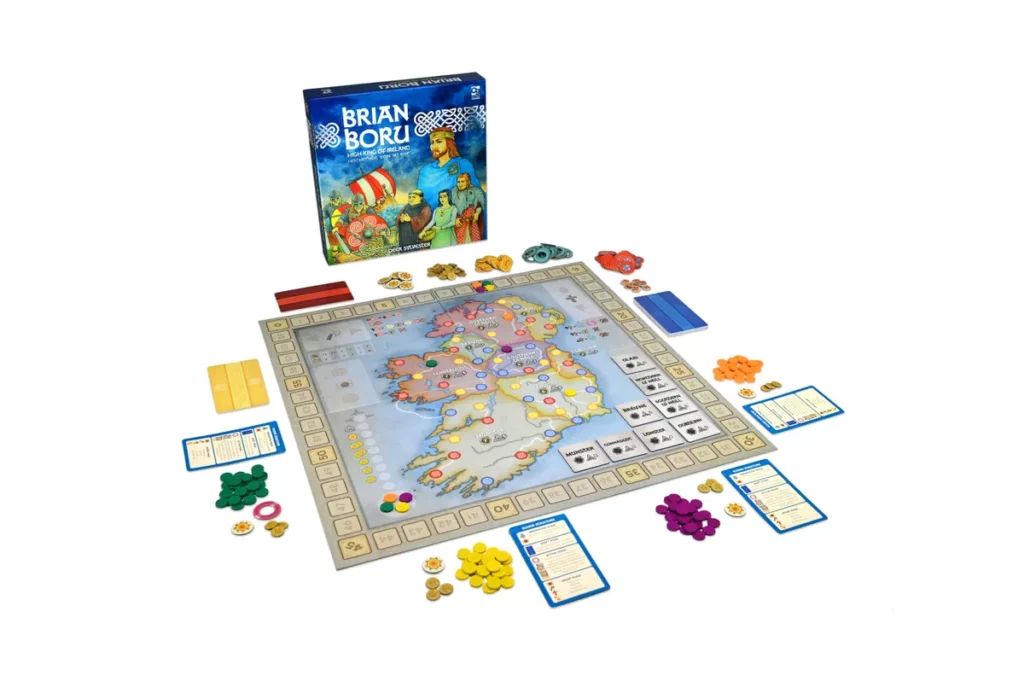
I love how engaged every player is, and how interactive the game is. Concentrating on your own plans will only get you so far, and it doesn’t take long to realise that. The rest of the game is in reading the players around the table, trying to work out their plans, what cards they might be holding, and what you can do to piss on their shamrocks. Peer Sylvester has done it again, and Osprey Games have another hit on their hands, I just hope a future printing revises the rulebook.
I get that this might not be everyone’s cup of tea, with the dry theme and area control, but I love it. It’s going to take something special to knock this off my top spot this year.
Review copy kindly provided by Osprey Games. Thoughts and opinions are my own.
Brian Boru is available from our sponsor – Kienda. Sign-up using this link to get 5% off your first order over £60.
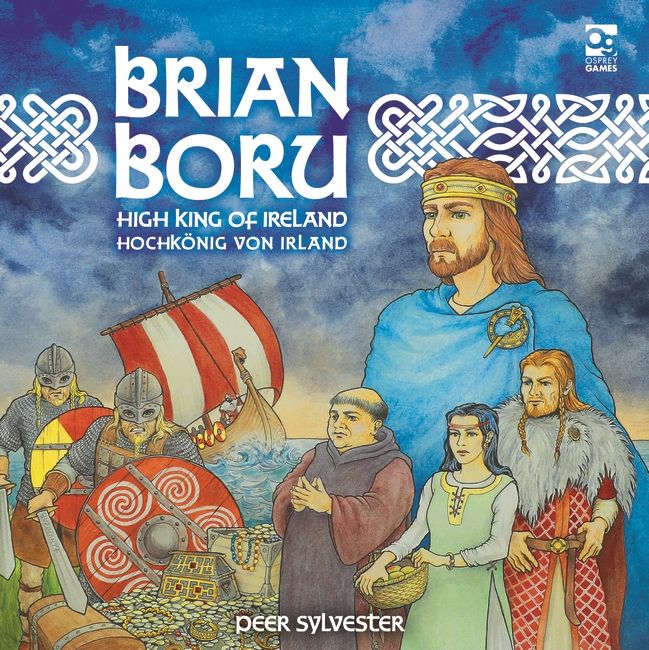
Brian Boru: High King of Ireland (2021)
Designer: Peer Sylvester
Publisher: Osprey Games
Art: Deirdre de Barra
Players: 3-5
Playing time: 60-90 mins



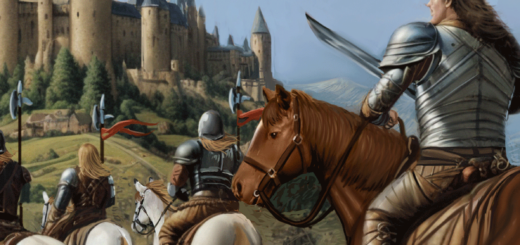
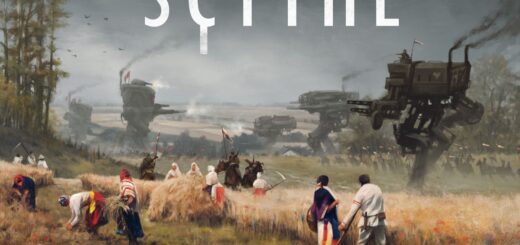










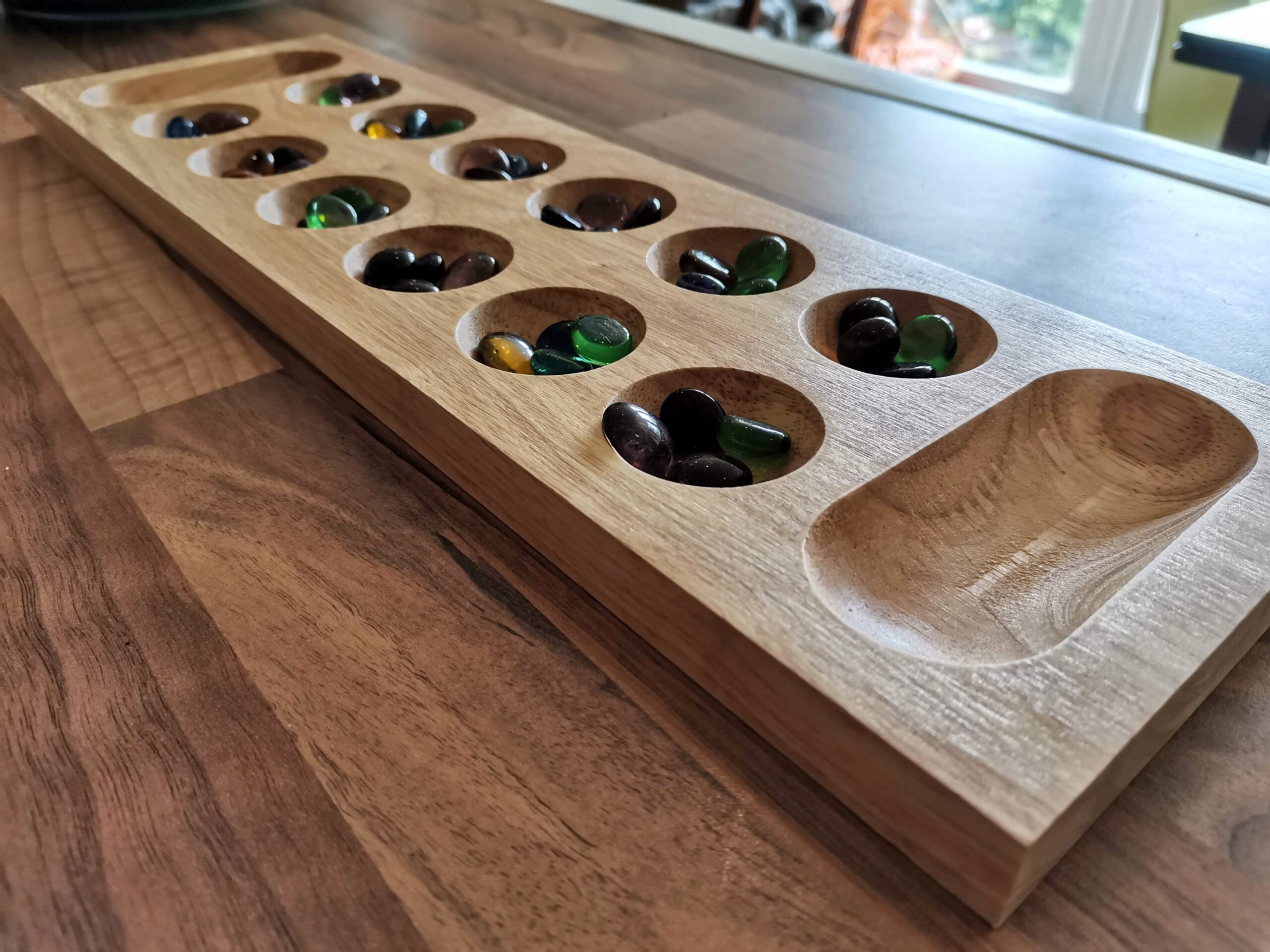




Great game, and I agree it really shines at higher player counts